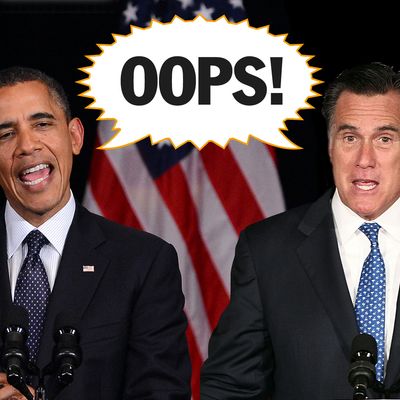
Why does the presidential race appear, at least on the basis of campaign coverage, to be nothing but a succession of gaffes? A week or two will go by without news, and then either President Obama or Mitt Romney will say something damaging, and that comment will define the contours of the debate until the next verbal own goal.
The centrality of the gaffe is an outgrowth of horse race coverage. Political reporters have little interest in informing the public about the policies advocated by the two candidates. Their job is to tell us every day who is winning. And since very little changes in the horse race from day to day, the main device they have to drive the narrative is the gaffe. The gaffe is a candidate saying something unplanned and unwelcome. As campaign reporters define their job, the gaffe is the primary form of “news.”
Michael Kinsley once famously defined a gaffe as when a politician tells the truth — not the truth about the world, but a true version of what he believes. The aphorism has been endlessly repeated. It’s actually among the least interesting observations in the column. (It’s only partially true: Many gaffes involve a politician saying something they don’t believe — say, Obama’s claim that the private sector is “fine,” Romney saying he enjoys firing people, and so on.) The rest of the column is actually a masterpiece, and still, 28 years later, the best exegesis of how gaffes work.
The column, unlike the line, has been largely forgotten. I have it in Kinsley’s 25-year-old collection of essays, Curse of the Giant Muffins, and it actually did not exist in electronic form at all — with the exception of a syndicated version reprinted in a PDF of a 1984 University of Minnesota student newspaper. (I prevailed upon TNR to create an online version today.) You ought to just read the column, but I will happily summarize and explain for the lazy.
The proximate subject of the column is a long-forgotten gaffe from the 1984 Democratic primary. Gary Hart made a joke about how his wife gets to campaign in California while he’s stuck in New Jersey, and the national media obsessed over the apparent offense to residents of the Garden State. As Kinsley notes, the episode is a perfect gaffe precisely because its content was so meaningless:
Political journalism has evolved in somewhat the same direction as literary criticism, which is now dominated by people called deconstructionists. Deconstructionist criticism is indifferent to the literary value of the “text” — novel or poem or whatever — it is analyzing. The “text” is just grist for arcane and self-referential analysis. A work of no special merit is even preferable in a way, since it doesn’t distract from the analysis, which is the real show.
Similarly, political journalism dwells in its own world of primaries and polls. If necessary, journalists can take a significant fact such as Jesse Jackson’s continuing embrace of the repellent Louis Farrakhan — drain it of all its moral implications, and turn it into a gaffe. But campaign mechanics make for preferable subject matter. And the ideal “text” for political journalism to chew on is an episode of no real meaning or importance — such as a small joke about New Jersey — which can then be analyzed without distraction exclusively in terms of its likely effect on the campaign. The analysis itself, of course, is what creates that effect: a triumph of criticism the deconstructionists can only envy.
I asked Kinsley how he thought this analysis had held up since 1984. “That’s gotten worse,” he told me. “It’s all gotten worse.”
Has it, really? The increasing speed of campaign coverage surely means that there are more gaffes now than ever before, and thus more opportunities for the soul-crushing stupidity of the process to display itself. At the same time, the sheer proliferation of gaffes means that no single gaffe can carry the weight that any of them did back in the days when a handful of print reporters and the big three networks set the daily narrative.
Kinsley’s column describes how a stray joke about New Jersey decided the outcome of the presidential nomination. Could that happen again? In 1968, George Romney used the term “brainwashing” — which a Detroit Free Press editorial had used a few days before — to describe the propaganda employed by the administration and the military to sell the Vietnam war. That ended his campaign. Would it be more than a three-day story now?
It is always tempting to gaze upon the mental wasteland around us and assume that we are looking at the ruins of something that was once great. But if the endless generation of “gaffes” is stupid, it is probably no stupider than it was a generation ago. Or perhaps we long ago hit bottom and couldn’t sink any lower. If you’re tempted to despair at the stupidity of a world in which Obama’s imprecise term for describing private sector growth is the defining issue of a gigantic political choice, at least comfort yourself with this fact: We’ll be moving on to some different stupid thing soon enough.






























